| Gemstone Chart |
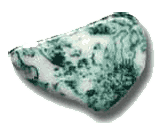 Natural Agate Natural Agate
Agate is a beautiful natural chalcedony stone, classified as a semi precious gem and has been used by people as early as the ancient Egyptians in and before 3000 BC! Agate is hard and tough enough to be incorporated into jewelry and other ornamental items.
Color: Blue, green, yellow,orange, brown, gray
Categories: semi-precious stone
Chemical Composition: SiO2
Crystal Group: Hexagonal
Refractive Index: 1.530 - 1.539
Hardness: 6.5 - 7
Density: 2.57 - 2.64
Occurrence: Scotland, U.S.A., India, England, Italy, Brazil, Uruguay, Germany, Egypt, Indonesia, and many other localities.
| 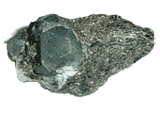 Natural Alexandrite Natural Alexandrite
Alexandrite was discovered in 1830 in the Ural mountains of Russia. Alexandrite is also found in Sri Lanka, Brazil, India, Tanzania, Zimbabwe, and most recently in Madagascar. The alexandrite variety of chrysoberyl is one of the rarest and most sought after of all gems.
Color: changing from green to red
Categories: semi-precious stone
Chemical Composition: BeAl2O4
Crystal Group: Orthorhombic
Refractive Index: 1.741 - 1.760
Hardness: 8.50
Density: 3.73
Occurrence: Tanzania, India, Russia, Madagascar, Sri Lanka, Zimbabwe, Zambia
| 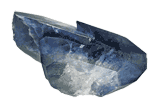 Natural Benitoite Natural Benitoite
Benitoite is considered to be a semi-precious gemstone. Very limited in nature and available from only one spot on earth (San Benito County, California), Benitoite is among the 10 rarest gemstones on earth
Color: Blue, white, colorless
Categories: semi-precious stone
Chemical Composition: BaTiSi3O6
Crystal Group: Hexagonal
Refractive Index: 1.757 – 1.804
Hardness: 6.5
Density: 3.65 – 3.68
Occurrence: San Benito County, California
| 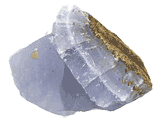 Natural Chalcedony Natural Chalcedony
Chalcedony is a catch all term that includes many well known varieties of cryptocrystalline quartz gemstones. They are found in all 50 States, in many colors and color combinations, and in sedimentary, igneous, and metamorphic rocks.
Color: grayish, purple, white, green, blue, lavender, yellow, brown
Categories: semi-precious stone
Chemical Composition: SiO2
Crystal Group: Hexagonal
Refractive Index: 1.530 - 1.539
Hardness: 6.5
Density: 2.57 – 2.64
Occurrence: Brazil, U.S.A. Germany, India, Uruguay, Austarlia, Egypt, Italy, Scotland, South Africa, Namibia, Madagascar, Mexico, Tanzania, and many other localities throughout the world.
| 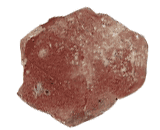 Natural Pezzottaite Natural Pezzottaite
Pezzottaite is a raspberry-red to pink member of the Beryl Group named after Dr. Federico Pezzotta. Discovered in Madagascar and IMA approved in 2003. It is one of the great new gem discoveries of the last 20 years.
Categories: semi-precious stone
Crystal Group: Trigonal
Refractive Index: 1.604 - 1.615
Density: 3.1
Occurrence: Madagascar, Afghanistan
| 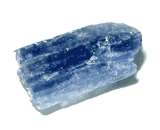 Natural Tanzanite Natural Tanzanite
Tanzanite is a rare gem which has been celebrated as one of the most exciting finds of the 20th century. Manuel D’Souza discovered the gem in 1967 in Tanzania. Because tanzanite is relatively soft, it is not usually set in necklaces and earrings, so the tiara is truly a rarity.
Color: Blue, Blue Purple, Green, Pink.
Categories: semi-precious stone
Chemical Composition: Ca2(Al,OH)Al2(SIO4)
Crystal Group: Orthorhombic
Refractive Index: 1.688 - 1.707
Hardness: 6-7
Density: 3.30 (+.10, -.10)
Occurrence: Tanzania
| 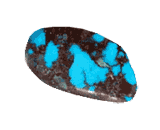 Natural Turquoise Natural Turquoise
Turquoise is an opaque, blue-to-green mineral that is a hydrous phosphate of copper and aluminium.The gem turquoise owes it's beauty almost entirely to its superb color. It has been used for ornamentation since 3000BC and possibly before.
Color: Blue, Greenish Blue
Categories: semi-precious stone
Chemical Composition: CuAl6(PO4)4(OH)85H2O
Crystal Group: Triclinic
Refractive Index: 1.62
Hardness: 5.5-6
Density: 2.60- 2.90
Occurrence: Iran, USA, India, Tibet, China, Egypt, Chile, Russia, Australia
|
|
